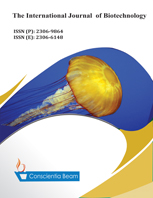Phytochemicals of Senna auriculata (L.) Roxb. (Fabaceae) Flowers as Potent Antibacterial and Antidiabetic Agents
DOI:
https://doi.org/10.18488/journal.57.2020.92.50.66Abstract
Contrary to the synthetic drugs, phytochemical constituents of plant origin possess an enormous therapeutic potential as antibacterial and antidiabetic agents. The phytochemicals of Senna auriculata floral extracts and avaram tea were screened and tested for antibacterial and antidiabetic properties respectively. Antibacterial activity was determined by disc diffusion method at 0.25, 0.50 and 1.00% concentrations against Escherichia coli, Klebsiella pneumonia, Pseudomonas aeruginosa and Staphylococcus aureus. Overall results indicated maximum antibacterial activity at the lowest concentration (0.25%) by the petroleum ether, acetone, ethyl acetate and methanol extracts against Escherichia coli, Staphylococcus aureus; Escherichia coli and Staphylococcus aureus and their respective zone of inhibition values were 32, 28, 22 and 15mm; at the highest concentration (1.00%) it was exhibited against Staphylococcus aureus for all extracts except for methanol against Klebsiella pneumonia and the values were 36, 34, 30 and 19mm respectively. Experiments were carried with male albino wistar mice treated with streptozotocin to study the antidiabetic property for a period of 21 days. The body weight of mice after treatment decreased on Day 7 when compared to Day 3 and then increased on Day 14 and 21. The blood glucose level decreased right from Day 3 to 21. Further, it is suggested that the molecular basis for the modes of action of plant-based antibiotics and antidiabetics be ascertained and determined.

